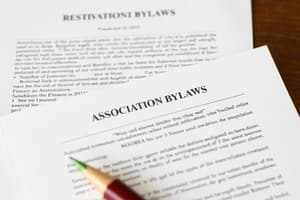Podcast
Questions and Answers
What is the primary concern of a board of directors?
What is the primary concern of a board of directors?
- Evaluating the performance of the executive director
- Establishing the mission, vision, and values of the organization
- Building relationships with external stakeholders
- Exercising due diligence and avoiding legal repercussions (correct)
What is one of the key areas of responsibility for a board of directors?
What is one of the key areas of responsibility for a board of directors?
- Implementing management systems
- Managing daily operations
- Assessing organizational performance (correct)
- Developing marketing strategies
What is a key aspect of decision-making in a board of directors?
What is a key aspect of decision-making in a board of directors?
- Clear roles and responsibilities are defined for decision-making (correct)
- Decisions are made by a single board member
- All board members have equal input in decision-making
- Only the chairperson has decision-making authority
What is a key challenge for a board of directors in terms of resource development?
What is a key challenge for a board of directors in terms of resource development?
What is a key aspect of the board's fiscal/legal oversight function?
What is a key aspect of the board's fiscal/legal oversight function?
What is a key aspect of the board's role in selecting the executive director?
What is a key aspect of the board's role in selecting the executive director?
What is a key aspect of the CEO/Executive Director's role in relation to the board's culture?
What is a key aspect of the CEO/Executive Director's role in relation to the board's culture?
What is a characteristic of a board chair with a positive impact?
What is a characteristic of a board chair with a positive impact?
Why do boards often fail to change without external influence?
Why do boards often fail to change without external influence?
What is a common reason why boards only change when influenced by external factors?
What is a common reason why boards only change when influenced by external factors?
What is the name of the tool that helps boards identify areas for improvement?
What is the name of the tool that helps boards identify areas for improvement?
What is a potential issue with a board's role, according to the text?
What is a potential issue with a board's role, according to the text?
What is the primary role of the board in terms of management systems?
What is the primary role of the board in terms of management systems?
What determines the authority of the board in an organization?
What determines the authority of the board in an organization?
What is the primary responsibility of the board in terms of the organization's performance?
What is the primary responsibility of the board in terms of the organization's performance?
What is the purpose of a board committee?
What is the purpose of a board committee?
What is a key consideration when determining the size of a board?
What is a key consideration when determining the size of a board?
What is the informal culture of the board?
What is the informal culture of the board?
What is a primary reason why boards are important in nonprofit organizations?
What is a primary reason why boards are important in nonprofit organizations?
What is a common cause of boards contributing 'negative value'?
What is a common cause of boards contributing 'negative value'?
What is the primary focus of a governance-only board?
What is the primary focus of a governance-only board?
What is the role of a board member acting as an advisor?
What is the role of a board member acting as an advisor?
What is the primary characteristic of a working board?
What is the primary characteristic of a working board?
What type of board is characterized by a mix of strategic planning and operational involvement?
What type of board is characterized by a mix of strategic planning and operational involvement?
What motivated boards that made changes to develop and improve their performance?
What motivated boards that made changes to develop and improve their performance?
What is the result of boards that made specific changes?
What is the result of boards that made specific changes?
What is the current state of research on the impact of board governance on organizational success?
What is the current state of research on the impact of board governance on organizational success?
What is a characteristic of boards that might cause severe problems for the organization?
What is a characteristic of boards that might cause severe problems for the organization?
What is required for a board to achieve outstanding performance?
What is required for a board to achieve outstanding performance?
What is a key requirement for those responsible for the success of a non-profit organization?
What is a key requirement for those responsible for the success of a non-profit organization?
Study Notes
The Role of Boards of Directors in Nonprofit Organization Governance
- There is no "one best way" of structuring the roles and responsibilities of a board of directors that fits all situations.
- Boards cannot avoid their legal requirements of exercising "due diligence."
- Every board member has a role to play in deciding, implementing decisions, and assessing their outcomes.
Board Responsibility Areas
- Establishing the mission, vision, values, goals, strategic priorities, and assessing organizational performance.
- Fiscal/legal oversight function and risk assessment.
- Selecting and evaluating the executive director.
- Building the optimal relationships between the board and the organization's external stakeholders.
- Defining the board's role in resource development.
- Role in the development and assessment of management systems.
How the Board Works
- The board chair and CEO/executive director have complementary roles that influence the board's culture.
- Effective board chairs: trustworthy, good listeners, effective communicators, clarify issues, and develop team spirit.
Changing Board Behavior
- Three key questions: identifying the need for change, deciding what changes to make, and assessing the impact on organizational effectiveness.
- Boards do not intentionally change due to lack of feedback, compliance, and external influences.
Board Effectiveness Survey Application (BESA)
- A tool to assess board effectiveness and identify areas for improvement.
Board Responsibility Areas (Continued)
- Ensuring processes, policies, and procedures are in place to manage the organization.
- Assessing the overall performance of the organization.
How Does the Board Work?
- Five factors to consider: board structure, effective meetings, composition and development, informal culture, and leadership.
- Board structure is formalized in the organization's bylaws.
- Key questions to consider: what is the best size for a board, what positions should exist, and what authority should the board have?
The Role of Boards of Directors
- Boards are legally responsible for the actions of the organization.
- They ensure the organization achieves its mission, manages finances, and complies with laws.
Board Role Clarity
- Clarity over responsibilities is crucial; lack of clarity contributes to "negative value."
- Three roles board members may play: decision-maker/evaluator, advisor, and implementer.
Board Decision-Making Models
- Three common models: working board, governance-only board, and mixed-model board.
Changing Board Behavior (Continued)
- Boards that made changes were more likely to be motivated by internal development and improvement.
- Changes in board governance practices can lead to improvements in organizational effectiveness.
Conclusion
- There is a lack of solid research proving that certain board structures or procedures lead to better organizational performance.
- Boards with unclear roles and inability to focus on the "big picture" can cause problems for the organization.
- Boards must adapt to their context and contingencies to achieve success.
Studying That Suits You
Use AI to generate personalized quizzes and flashcards to suit your learning preferences.
Description
Learn about the importance of boards of directors in nonprofit organizations, including their legal responsibilities and role in achieving the organization's mission.




